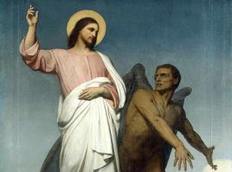
This morning I had Mass at the Missionaries of Charity AIDS shelter. One of the sisters had written the Mass intention on a little note, as the sisters are wont to do. I read it quickly: ‘father, please offer this Mass for Anthony on his death anniversary, and for Sr. Aldo.” So at Mass I said, “we offer this Mass for Anthony, on the anniversary of his death, and for Sr. Aldo, who has also died.” The sisters broke out into giggles. Sr. Aldo, it turns out, was standing in front of me and started becoming red (well, she’s from Kenya and can’t get very red). Later, in the sacristy, the superior said, “Father, you gave Sr. Aldo a whole day’s supply of meditation on death.” I laughed a little myself and said “glad to be of assistance.” That was how my Mass went this morning; the following, if you wish, is my homily from Sunday.
Weapons of Self-Restraint
We have entered into the great and holy season of Lent, “taking up battle against spiritual evils armed with weapons of self-restraint,” as the Ash Wednesday prayer says. We face these three adversaries bearing three spiritual weapons: prayer, fasting, and almsgiving. All three work together, and all three are necessary for an effective Christian witness. Prayer without fasting would be mere sentimentality and fasting without prayer would be simply an exercise of willpower. The third weapon, almsgiving, proves that prayer and fasting are not just self-absorbed religious fantasies. In giving alms, I prove that I love someone outside of myself. This Sunday, I’m going to talk about almsgiving, because it is Archdiocesan Annual Appeal Sunday. I do not apologize for asking you for financial gifts toward the Archdiocese because almsgiving is an essential part of our Christian life. We are almost as afraid of serious almsgiving (tithing) as we are of serious fasting. But once you get over the initial fear, God does miracles in your life. The giver of all gifts will not and cannot be outdone in generosity. He will always give us more than we give Him. We make room for the miraculous by emptying ourselves of at least something of the mundane.
Believing in the Gift
In the first reading, the serpent plants doubt in Eve’s heart. “Did God really tell you not to eat that fruit?” In other words, can you trust your father? The devil outrageously lies. God has given us everything we have and are. Has He ever not provided our basic needs? Is there any reason to think He will not provide for us in the future? And yet we do doubt Him, weak and quivering as we are. The serpent says: “you surely will not die.” I hate to tell you, but everyone in this church will die. That’s why we got our ashes on Wednesday. No one gets out of this church alive. And we will die precisely because we did not trust our Father. The way back to life is to trust Him again. We will be like God, for it is He himself who put this desire in our hearts, and made us in His image.
The same devil appears to Christ in the desert after his forty day fast. “If you are the Son of God….” Again he tries to plant doubt in his victim’s heart: you are not really his son; he is not your father. See how he is letting you suffer. He is really asking too much of you! Jesus’ response, unlike Eve’s, is to trust: My bread is to do the will of my Father. And that’s what fasting does for us—leads us to trust God more, and trust ourselves less. Finally, St. Paul, in the second reading, uses the word “gift” five times: “The gift is not like the transgression.” God gave Adam and Eve the gift of paradise, but they distrusted him, and transgressed his law. So he gave another gift—his own Son. And by this gift, the many will be made righteous. They will live forever.
As we enter into this Holy Season, let’s try to believe in the gift. All of life is a gift from the Father, and when we give gifts ourselves, we become godlike. Open your hands, and give gifts this Lent, gifts that were first given you by our gracious and loving father.


 RSS Feed
RSS Feed